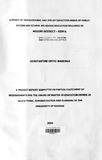| dc.description.abstract | The purpose of this study was to identify the motivational and job satisfaction needs of public
secondary school religious education teachers in Migori District. In finding out extent of the following variables;
the school type, gender, age and professional qualifications influence the motivational needs of secondary school
religious education teachers. The problem of the high turnover and low morale amongst religious education
teachers was elicited. The central significance of the study was viewed as that of providing feedback to the
Ministry of Education Science and Technology to assess the immediate motivational needs of the teachers
involved in the study. The literature review covered the concept of motivational patterns of workers with specific
reference to religious education teachers and factors, which influence their motivation and job satisfaction levels,
in Kenya and the rest of the world. The ex-post-facto research design was used in the study. And the research
objectives were used to develop the research instruments. A questionnaire was used in data collection, which
comprised three major parts. Part A contained 16 open-ended questions. Part B focused on religious education
teachers' motivational scale (R.E.T.M.S.) and consisted of 20, seven-point Likert Scale questions. Part C elicited
information on religious education teachers' job satisfaction scale (R.E.T.J.S.) which contained 15, six-point
Likert scale questions. The population from which the sample was obtained was 120 religious education teachers.
The instrument was administered to 92 religious education teachers in Migori District. The sample for this study
was selected using systematic sampling procedures. The T -test for independent sample was used to test if there
was significant difference in motivational needs and job satisfaction scores between male and female religious
education teachers. A hypothesis was rejected or not rejected at 0.05 level of significance. The one way Analysis
of Variance (ANOV A) was used to test if there were significant differences in motivational scores of religious
education trained university graduate teachers, and diploma teachers. ANOV A was also used to determine
whether there was any significant difference in job satisfaction scores among (a) trained university graduates and
diploma teachers and (b) among teachers of different age groups. The analysis of religious education teachers'
demographic background in Migori District revealed that teachers had a short experience in the teaching
profession. Teachers with less than fifteen years teaching experience formed 76.0 percent of the teachers
considered in this study. This implies that the turnover among teachers is high. On the basis of the findings from
this study and the conclusions drawn, the following recommendations were pointed out which could work towards
improving the motivational and job satisfaction needs of religious education in teachers in Kenya's public
secondary schools. (i) Educational managers should improve on the remuneration of religious education teachers.
(ii) It is evident from the religious education teacher's responses that they felt dissatisfied with the methods used
in their promotion basing on both professional and academic qualifications. Thus, tying promotion to academic
performance will make religious education teachers work hard to excel in their profession. Indeed religious
education teachers should not stagnate in one professional grade for more than three years, as is the case currently.
(iii)The research showed that religious education teachers were working in poor conditions because teaching
materials and other equipment were not adequately supplied in most secondary schools. The Ministry of Education
Science and Technology should encourage strong parental and community support through the Parents' Teachers'
Associations and Board of Governors. These bodies should ensure that secondary schools are well equipped with
the necessary facilities for providing quality education. (iv)It has been noted in this study that religious education
teachers feel neglected by the Teachers Service Commission especially in payment of special allowances because
their counterparts who teach languages, technical subjects, mathematics and sciences enjoy a special allowance.
More importantly, they are also not allowed to proceed for further studies with paid study leave in their area of
specialisation, unlike their counterparts in languages, mathematics and sciences. The Ministry of Education
Science and Technology should therefore regularise these discrepancies. (v) Immediate supervision can play an
important role in motivational programmes that may be effective to different teachers. The head teachers are in the
best position to define clear education goals at the institutional level and provide appropriate rewards to teachers.
Therefore, they should be empowered to recommend teachers for promotion. | en |

